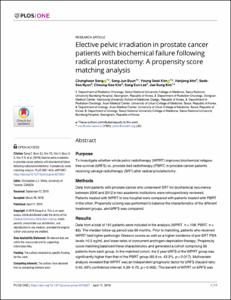KUMEL Repository
1. Journal Papers (연구논문)
1. School of Medicine (의과대학)
Dept. of Radiation Oncology (방사선종양학)
Elective pelvic irradiation in prostate cancer patients with biochemical failure following radical prostatectomy: A propensity score matching analysis
- Keimyung Author(s)
- Byun, Sang Jun
- Department
- Dept. of Radiation Oncology (방사선종양학)
- Journal Title
- PLoS One
- Issued Date
- 2019
- Volume
- 14
- Issue
- 4
- Abstract
- Purpose
To investigate whether whole pelvic radiotherapy (WPRT) improves biochemical relapsefree survival (bRFS) vs. prostate bed radiotherapy (PBRT) in prostate cancer patients receiving salvage radiotherapy (SRT) after radical prostatectomy.
Methods
Data from patients with prostate cancer who underwent SRT for biochemical recurrence between 2005 and 2012 in two academic institutions were retrospectively reviewed. Patients treated with WPRT in one hospital were compared with patients treated with PBRT in the other. Propensity scoring was performed to balance the characteristics of the different treatment groups, and bRFS was compared.
Results
Data from a total of 191 patients were included in the analysis (WPRT, n = 108; PBRT, n = 83). The median follow-up period was 66 months. Prior to matching, patients who received WPRT had higher pathologic Gleason scores as well as a higher incidence of pre-SRT PSA levels >0.5 ng/mL and lower rates of concurrent androgen-deprivation therapy. Propensity score matching balanced these characteristics and generated a cohort comprising 56 patients from each group. In the matched cohort, the 5 year bRFS of the WPRT group was significantly higher than that of the PBRT group (65.9 vs. 42.2%, p = 0.017). Multivariate analysis revealed that WPRT was an independent prognostic factor for bRFS (hazard ratio: 0.45, 95% confidence interval: 0.26–0.75, p = 0.002). This benefit of WPRT on bRFS was maintained in subgroup analyses, especially in patients with preoperative PSA level ≤20 ng/mL or pre-SRT PSA level ≥0.4 ng/mL.
Conclusions
These data suggest that, following radical prostatectomy, elective WPRT during SRT may improve bRFS compared with PBRT in selected patients. Patients with preoperative PSA level ≤20 ng/mL or pre-SRT PSA level ≥0.4 ng/mL represent a potential subgroup who benefit most from receiving WPRT. Results of prospective randomized trials are awaited to confirm this finding.
- Keimyung Author(s)(Kor)
- 변상준
- Publisher
- School of Medicine (의과대학)
- Citation
- Changhoon Song et al. (2019). Elective pelvic irradiation in prostate cancer patients with biochemical failure following radical prostatectomy: A propensity score matching analysis. PLoS One, 14(4), e0215057–e0215057. doi: 10.1371/journal.pone.0215057
- Type
- Article
- ISSN
- 1932-6203
- Source
- https://journals.plos.org/plosone/article?id=10.1371/journal.pone.0215057
- Appears in Collections:
- 1. School of Medicine (의과대학) > Dept. of Radiation Oncology (방사선종양학)
- 파일 목록
-
-
Download
 oak-2019-0109.pdf
기타 데이터 / 1.03 MB / Adobe PDF
oak-2019-0109.pdf
기타 데이터 / 1.03 MB / Adobe PDF
-
Items in Repository are protected by copyright, with all rights reserved, unless otherwise indicated.